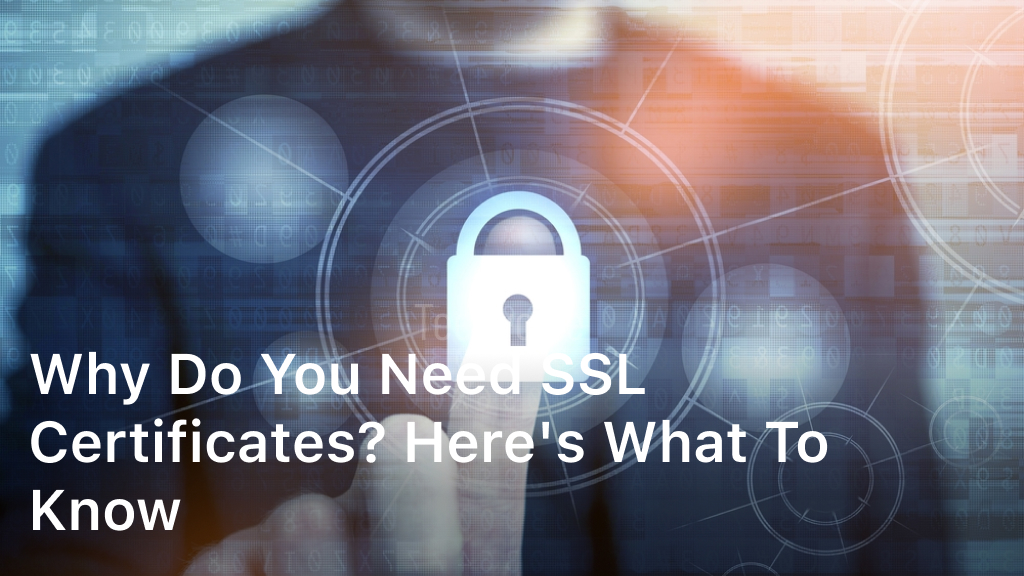Are you trying to secure your website and confused about SSL certificates?
You’re not alone. The digital world can feel overwhelming, but we’re here to guide you.
Cyber threats are increasing, making it crucial to protect your site.
Your website’s integrity, user privacy and customer trust rely on strong security.
SSL certificates play a key role in guarding your online space.
We want to make SSL certificates easy to understand for you.
Understanding SSL certificates can be simple with the right information.
Now’s the time to improve your website’s security. Our guide will help clear any confusion.
Armed with knowledge, you can secure your digital presence with SSL protection.
What Are SSL Certificates and Why Do You Need Them?
In our digital world, SSL certificates are crucial for cyber security.
They do more than just add a padlock icon to your website. They build a foundation of trust with your visitors.
Knowing what SSL certificates are helps understand their importance.
They keep sensitive information safe and help maintain a professional look online.
Understanding SSL Certificates
An SSL certificate is a small digital file. It connects a security key to a company’s details.
Once added to a server, it starts the HTTPS protocol. This allows safe web server to browser connections.
SSL certificates also go through strict checks. These checks make sure both sides of a transaction are genuine. They’re key in website security, as any guide will tell you.
The Role of SSL in Website Security
SSL certificates do more than encrypt information. They confirm a website’s authenticity to its users.
They prove a site is safe to share personal info with. This stops bad actors from stealing data. The careful checks boost user trust and confidence.
So, SSL certificates don’t just keep data safe. They also help build a secure and trusted online world.
Different Types of SSL Certificates Explained
Website security begins with understanding SSL certificates.
These are data files that link a security key to an organization’s details.
Once installed, they make web server to browser connections secure.
We’ll explore three main types: Domain Validated (DV), Organization Validated (OV) and Extended Validation (EV) Certificates.
Domain Validated certificates are basic but vital for personal sites or blogs.
The issuer checks if the applicant controls the domain, usually through email or DNS.
DV certificates are less costly and quick to get. However, they’re seen as less trustworthy because they don’t require much validation.
Organization Validated certificates offer more trust.
They prove domain ownership and check the organization’s operational status. Details like the name, city and country are verified.
OV certificates suit websites that handle business transactions. They tell users the site is legitimate.
Extended Validation certificates are the most thorough.
Companies must prove their legal, operational and physical presence.
This process includes identity checks and ensuring the organization knows about the SSL request.
EV certificates show the highest trust with browser cues like a green address bar or padlock symbol.
The choice among SSL certificates depends on your security needs, business type and desired trust level.
DV certificates might be enough for personal pages. However, e-commerce sites and those handling personal data should consider OV or EV certificates.
Each SSL type plays a role in creating a secure online space for users.
How Do SSL Certificates Work?

SSL certificates are a bit like the magic that keeps our online data safe.
They work by using encryption to secure data when it’s sent from one place to another.
Also, they check the website’s authenticity. This makes sure we’re sending information to the right place.
The Encryption Process Behind SSL
An SSL certificate scrambles data into a secret code during transfer.
This includes things like your personal details or credit card info.
It uses two keys for this, a public key everyone can see and a private key that’s kept hidden.
Thanks to these keys, even if someone gets their hands on the data, they can’t understand it.
The Validation Procedures of SSL Certificates
SSL certificates also prove a website is trustworthy.
Certificate Authorities (CAs) do thorough checks before giving out a certificate.
They check if the website is really who they say they are.
This could be a simple check or a more detailed investigation.
This not only keeps data safe but also makes us feel confident about using the website.
The Benefits of Having an SSL Certificate
Understanding the ssl certificate benefits is crucial for any website owner.
They offer a safe and trustworthy environment online.
One main benefit is enhancing cybersecurity. This includes protecting personal data, credit card info and login details through encryption.
This protection stops unauthorized access.
Another key benefit is boosting consumer confidence.
When visitors see the padlock icon and ‘https://’ in the address bar, they know the site is secure.
This trust encourages them to engage more with the site.
Feeling secure can lead to more transactions.
Customers are more likely to share sensitive information.
An often-overlooked ssl certificate benefit is SEO improvement.
Search engines prefer secure sites, enhancing your visibility on results pages.
This boosts your site’s traffic organically.
Avoiding browser warnings is also essential. Modern browsers warn users if a site is not secure.
This can drive people away and harm your reputation.
With an SSL certificate, these warnings don’t appear.
This makes for a better user experience. In today’s online world, having an SSL certificate is vital.
It protects data and gives you an edge in the marketplace. It’s a key investment with clear benefits.
Confused About SSL Certificate Selection? Here’s How to Choose
Choosing the right SSL certificate means understanding different types and their fit with your site’s needs.
Not every certificate is the same in trust or validation.
Your choice should match your website’s goals and what it does.
Matching Certificate Types to Your Needs
Think about what your website does and the kind of info it handles.
A Domain Validated (DV) certificate could be enough for a blog, giving basic encryption.
If your site deals with private info or transactions, consider an Organization Validated (OV) or Extended Validation (EV) certificate.
They add extra trust by checking more than just your domain.
Take the time to understand how each certificate type protects your site.
This way, you make a choice that fits your website’s needs best.
Assessing Certificate Authorities
It’s critical to choose a credible SSL certificate provider.
A good provider guarantees your site’s security.
Look at the reputation, dependability and support of different authorities.
Check their history, how they handle security issues and what customers say.
Ultimately, choosing an SSL certificate should not be overwhelming.
By matching the right certificate to your needs and picking a trustworthy authority, you can secure your site effectively.
These steps will help protect your online space and make your visitors feel safe.
Step-by-Step SSL Certificate Installation Guide
Installing an SSL certificate shouldn’t be complicated.
After getting the right SSL for your site, it’s time to install it.
The process may vary by hosting platform. Yet, the main steps are mostly the same.
We’ll make sure your website is safe with these steps.
First, generate a Certificate Signing Request (CSR) on your server.
This request needs details about your site and company.
After you submit this to your SSL provider, and they confirm it, you’ll get your certificate files.
These usually include a primary, a root and an intermediate certificate.
Next, you need to upload these files to your hosting server.
Depending on your host, this might mean using a control panel or SSH. Find where you can manage SSL/TLS and upload your files.
Some hosts let you paste the certificate contents directly into a field.
Then, set up your web server to use the SSL certificate.
Editing your site’s config files might be necessary if you’re using Apache or Nginx.
Managed hosts usually have a user-friendly interface for this. After configuring, restart your server to see the changes.
Lastly, make sure your site works over HTTPS. Check this by visiting ‘https://www.yourdomain.com’.
Look for the padlock icon in your browser, showing a secure connection.
This means your SSL is installed right.
Always keep an eye on your SSL’s expiry date to renew it in time.
Keeping your website secure is ongoing. It all begins with a successful SSL setup.
Best Security Practices for SSL Certificate Management
Securing your digital assets with good SSL certificate practices is key.
These actions encrypt and guard your data, building trust with your users.
We’ll explore how to keep your site safe with regular maintenance, updates and solving SSL problems.
Routine Maintenance and Updates
Ignoring SSL certificate maintenance can lead to big problems.
Make sure to check your certificates often to ensure they’re working right.
Also, stay updated on new releases from your certificate provider to fix any weak spots and keep your encryption strong.
Dealing with Common SSL Issues
Sometimes, issues like mixed content errors, expired certificates, or bad installations can happen.
When they do, you need to act fast and smart to fix them.
Knowing your host and SSL provider well can help you solve these problems quickly.
This keeps your site running smoothly and your SSL security tight.
Conclusion
SSL certificates are key in making websites safe and earning trust from users.
They play a huge role in protecting data and proving a site’s identity online.
Knowing about SSL certificates helps website owners improve their site’s security.
This boost in security can also help their sites rank better on search engines and look better to customers.
Choosing the right SSL certificate and managing it well is essential for strong cybersecurity.
The clear takeaway is that investing in SSL certificates is wise.
It protects your website and ensures safe interactions with users.
This guide has highlighted the importance of SSL certificates today.
Using SSL technology is crucial for keeping data safe and networks secure.
It builds a foundation of trust with users.
Don’t let SSL’s complexities scare you off.
FAQ
What are SSL certificates?
SSL certificates are special digital certificates. They make communication between a website and visitors safe. They encrypt data sent between users and websites. This protects the data from unauthorized access.
Why do you need SSL certificates?
SSL certificates are very important. They make your website look trustworthy by showing a padlock icon in the address bar. They keep information like login details and credit card numbers safe from hackers.
How do SSL certificates work?
SSL certificates use secret codes to keep data safe. They use public and private keys to secure the data sent between browsers and servers. This means no one can steal or change the information being sent.
What are the different types of SSL certificates?
There are three main types of SSL certificates: DV, OV, and EV. DV certificates confirm the site is yours. OV and EV also check the organization’s identity, making them more trustworthy.
What are the benefits of having an SSL certificate?
SSL certificates have many benefits. They make your site more trustworthy and safe. They improve your site’s search rankings. They also keep sensitive information safe and stop browsers from showing warnings.
How do I choose the right SSL certificate for my website?
Choosing the right SSL certificate depends on your needs. Think about what validation level you need and if you need to secure subdomains. Look for a trusted certificate provider. This will ensure you get a reliable certificate.
How do I install an SSL certificate on my website?
Installing an SSL certificate varies by web hosting platform. You usually start with a CSR and submit it to get the certificate. After getting the certificate files, install them on your server. Check with your hosting provider for detailed steps.
What are the best security practices for managing SSL certificates?
For top security with SSL certificates, stay up to date. Keep an eye on certificate expiration dates. Use strong codes and key lengths. Watch out for SSL vulnerabilities. Following these steps keeps your site secure.





